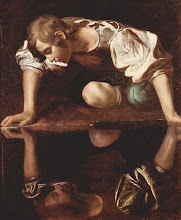The BBC alerts us to a legal spat between Wikimedia (the owner of Wikipedia and Wikicommons) and London's National Portrait Gallery. Wikimedia gives its arguments on its blog, but if the National Portrait Gallery is saying anything directly rather than through news media, I haven't been able to find it.
No doubt intellectual property and IT lawyers are going to have a field day. But I thought I'd just explain the policy I'm following here at Matters Arising. It's probably not totally logical and consistent, but then copyright law doesn't seem to be, either, and like the rest of us is adapting to the changing possibilities brought about by changing technology.
Basically, I use two main online collections for the art reproduced on this blog: Wikicommons and museumsyndicate. If a picture is not in either of those collections and the museum or gallery where I find the picture doesn't give permission to reproduce I simply provide a link.
Some museums and galleries are better than others. Special kudos goes to New York's Metropolitan Museum of Art, which does allow reproduction in certain circumstances and says so clearly. Other museums and galleries may allow reproduction but wrap it up in so much legal verbiage, it really is not clear what is allowed and what is not. When in doubt I don't. BUT, some museums and galleries (mentioning no names but you know who you are) seem to go out of their way to make it difficult even to link to pictures that they are showing online. In that case, as far as I'm concerned the picture is fair game for reproduction.
What are 5 facts about the Underground Railroad?
-
What are 5 Facts About the Underground Railroad? The Underground Railroad
wasn’t an actual railroad, but a clandestine network of safe houses and
routes ...
28 minutes ago





2 comments:
Yes, a museum does not have "intellectual" rights to the picture (though it obviously has physical rights because it owns it). It can only complain when a particular photograph of it that it took is reproduced. Which makes it all seem a bit academic.
Similarly with publishers. OUP does not have copyright on Toynbee's work, but only on its editions of Toynbee's work (typography, layout). The intellectual property resides with the writer's estate. Of course, the estate or even the author may have ceded that property to the publisher. Publishers might sue, estates are less likely to. Polly Toynbee said to me "it's up to OUP". OUP's position is unclear, though I've spoken to them. Meanwhile, they tolerate considerable swathes of his work at the Internet Archive – in pdfs showing their typography etc etc – and do nothing about it.
I might be wrong on above, but I think I'm right.
The other law on intellectual property is that two people are guaranteed to give you two different answers to any question.
The point about print publishers is nothing to do with when the writer died. 50 years, 75, whatever it is applies to the copyright owned by the estate.
Post a Comment